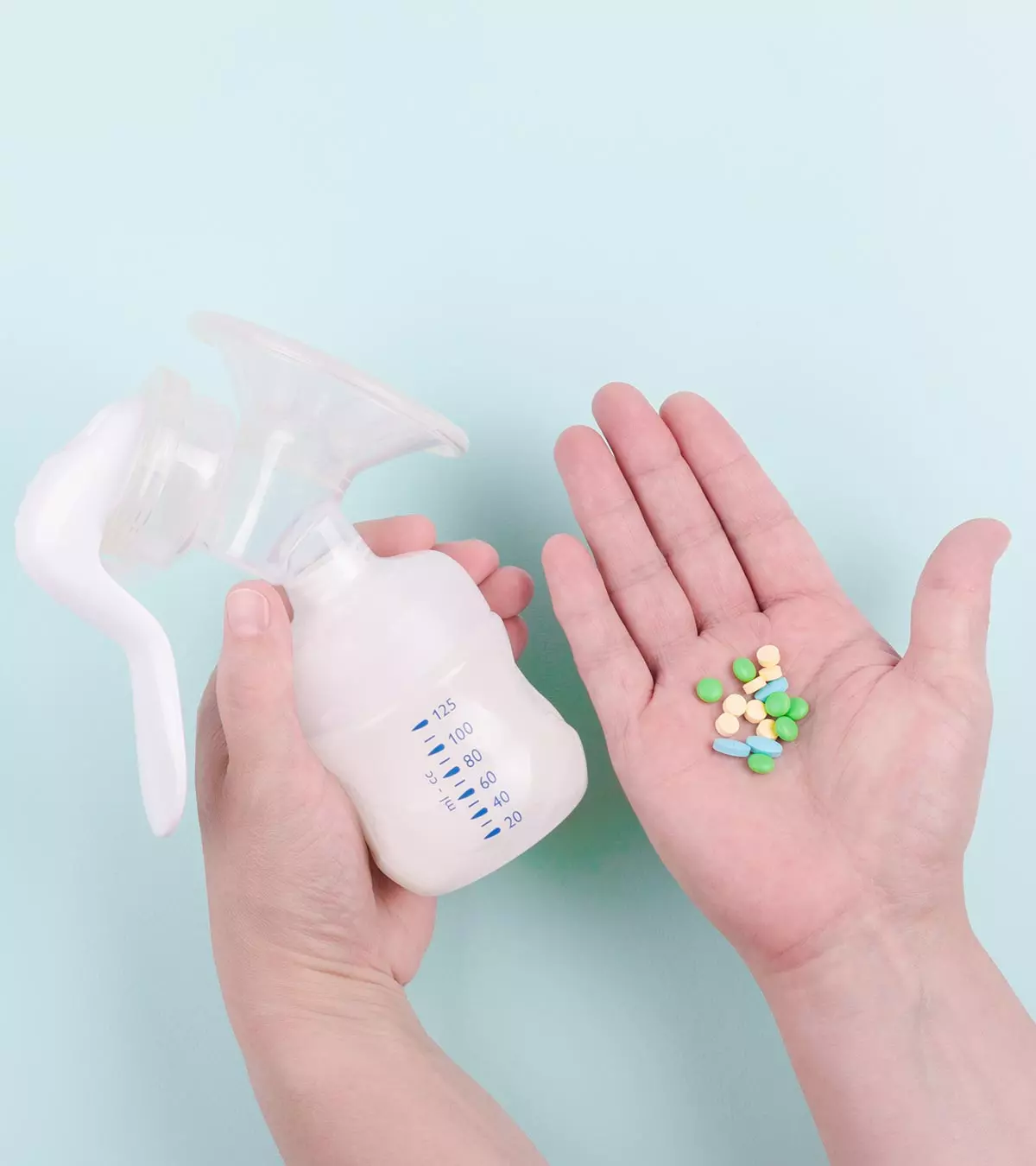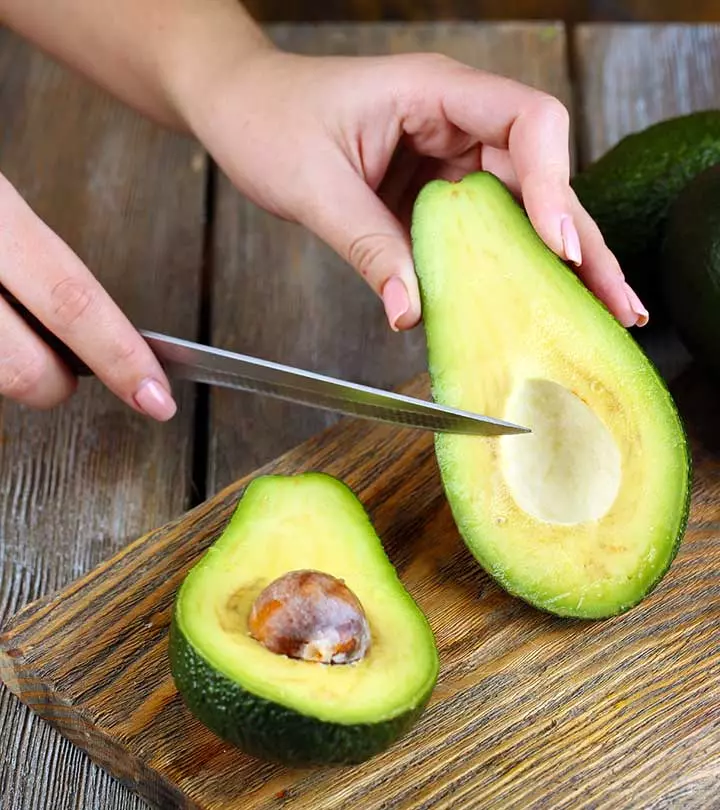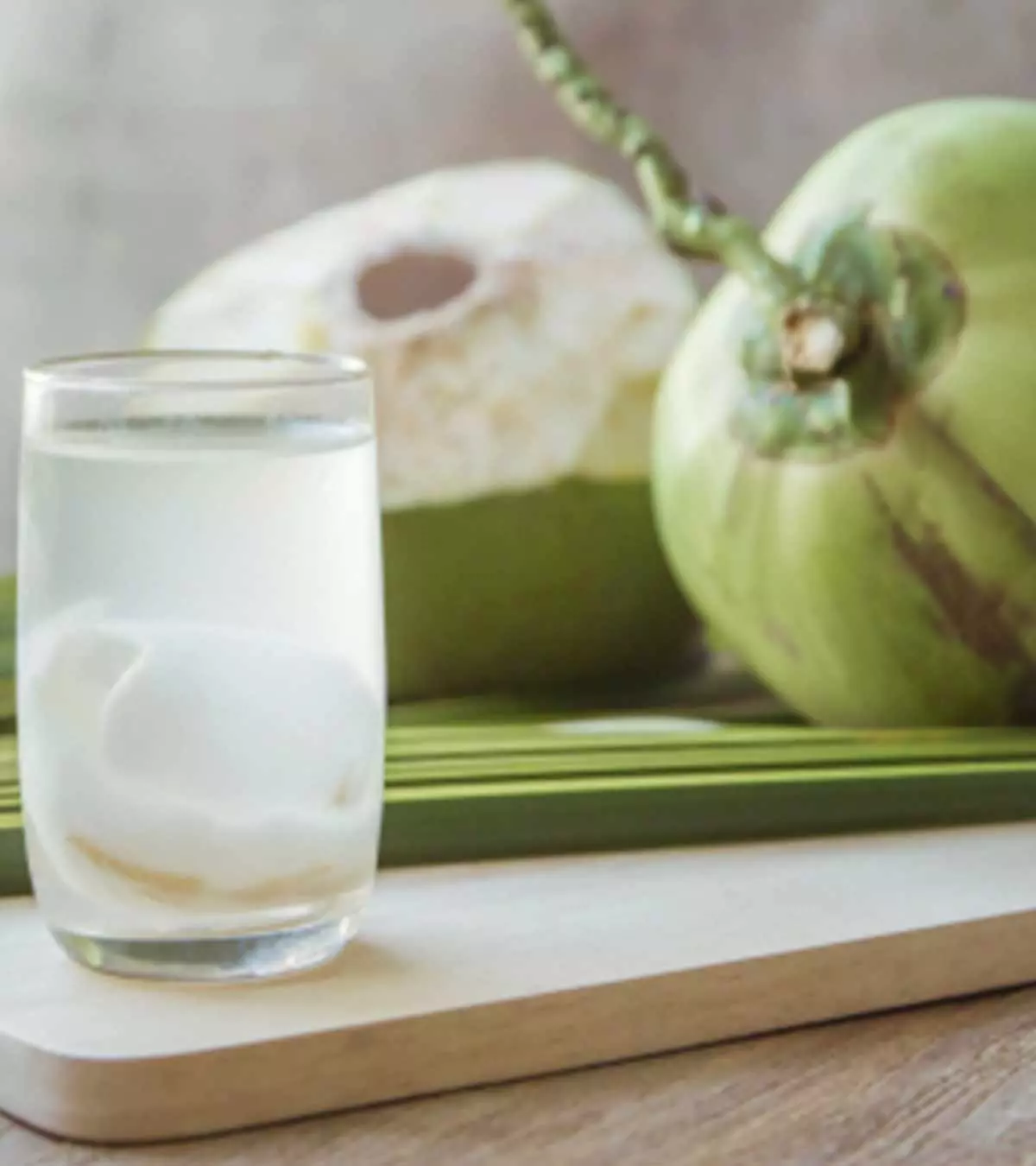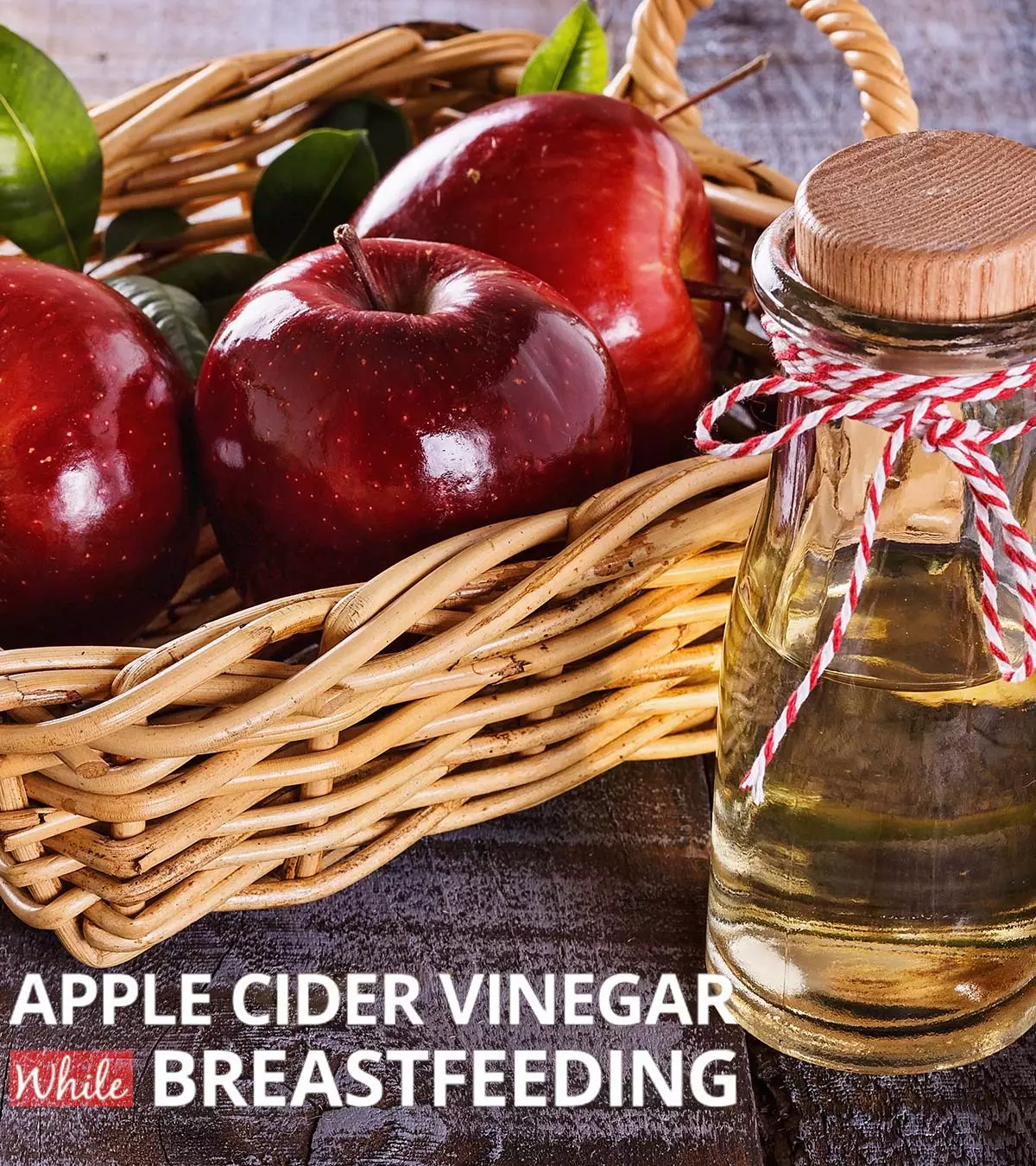
Image: Shutterstock
Apple cider vinegar (ACV) is made by processing apple cider, a fermented liquid derived from apple juice. It is common for many women to consider apple cider vinegar while breastfeeding due to its numerous health benefits. ACV is found to have the therapeutic properties of acetic acid, micronutrients, enzymes, and bioactive substances, making it a medically significant product (1). However, you might be wondering if you can consume apple cider vinegar while breastfeeding, and if so, does it affect the baby.
This post discusses ACV consumption during breastfeeding, including its safety, potential health benefits, adverse effects, and more.
Key Pointers
- Organic, filtered, and pasteurized apple cider vinegar (ACV) is considered safe for breastfeeding.
- ACV may offer several potential health benefits while breastfeeding, such as weight loss, blood sugar control, improved digestion, boosted immunity, better heart health, and detoxification.
- However, consuming ACV while breastfeeding may cause low potassium and sugar levels.
- ACV should be diluted with water and consumed in moderation, and mouthwash should be used after use.
Is It Safe To Use Apple Cider Vinegar When Breastfeeding?
Yes, organic, filtered, and pasteurized apple cider vinegar is safe to use when breastfeeding.
Raw and unpasteurized ACV can have several nutrients, but it might also contain bacteria from raw apple juice (2).
It is not entirely known if maternal consumption of the unpasteurized ACV has any effect on the baby’s health. But if bacteria affect the health of a lactating mother, then it might indirectly affect the breastfeeding baby as well.
Health Benefits Of Apple Cider Vinegar While Breastfeeding
Apple cider vinegar is considered to have acetic acid, pectin, multivitamins such as vitamin B1, vitamin B2, vitamin B6, biotin, and vitamin C.
It is also believed to have several bioactive compounds such as polyphenols that possess antioxidant activities (3).
1. Weight loss: The use of ACV might help in losing weight. A research study published in the Journal of Bioscience, Biotechnology, and Biochemistry, found that acetic acid could suppress body fat accumulation in animals. The study concluded that the daily intake of vinegar might be useful in reducing obesity that in turn, will help in the prevention of metabolic syndrome (4).
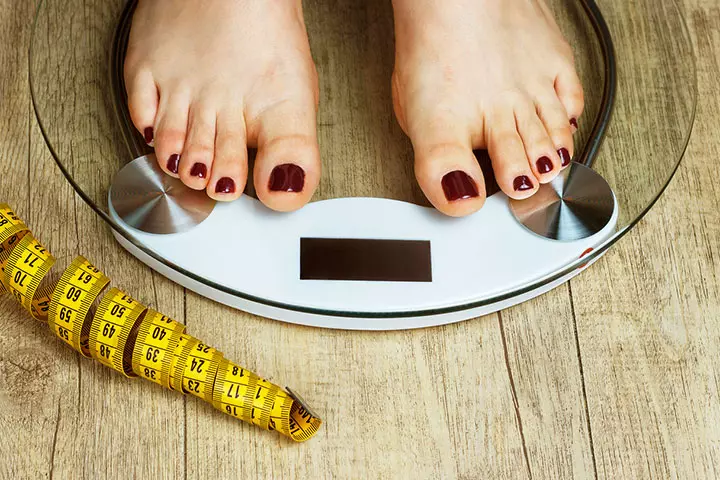
2. Regulates sugar: Acetic acid, as the base ingredient of vinegar, has shown to affect glucose metabolism and absorption, and thereby helps in blood sugar management (5). Besides, it has also shown to improve the functioning of pancreatic beta-cells in rats. Additionally, its effects on delayed gastric emptying post the intake of starchy meals has also been demonstrated in healthy individuals (6).
 Trivia
Trivia3. Digestive health: Apple cider vinegar, taken regularly, might help in maintaining gut health (3). It is believed to help enhance the gut microbiome due to its probiotic nature, potentially aiding digestion and reducing symptoms of bloating and discomfort. Regular consumption may promote better gut flora balance, essential for overall digestive health (17). However, there are limited clinical studies on its usefulness for digestive health. It is good to consult a doctor if you plan to take ACV for digestive health.
4. Improves immunity: A research study published in the International Journal of Vitamin and Nutrition Research attributed acetic acid to ACV’s antimicrobial properties that contribute to its immune system support (7) (8). Another study has demonstrated the immunomodulatory properties of cider vinegar (9).
A mom shares her positive experience with apple cider vinegar (ACV) and how it helped her with allergies while nursing. She explains a specific method her doctor suggested for preparing the ACV mixture, “Warm up half a cup of water, shake up your apple cider vinegar again, shake it up real good, measure two spoons and put them in the water, and that’s it. While I was nursing, I did this, and it worked well. I continued to take it sporadically over the course of 12 months of nursing (i).”
5. Heart health: A research study suggested that ACV can possibly help in lowering the risk of cardiovascular diseases. Regular consumption of ACV has shown to lower the LDL cholesterol and triglycerides in the serum (3). A study published in the Journal of Membrane Biology says that ACV possesses free radical scavenging properties and inhibits lipids peroxidation that is required to reduce serum lipid levels (10).
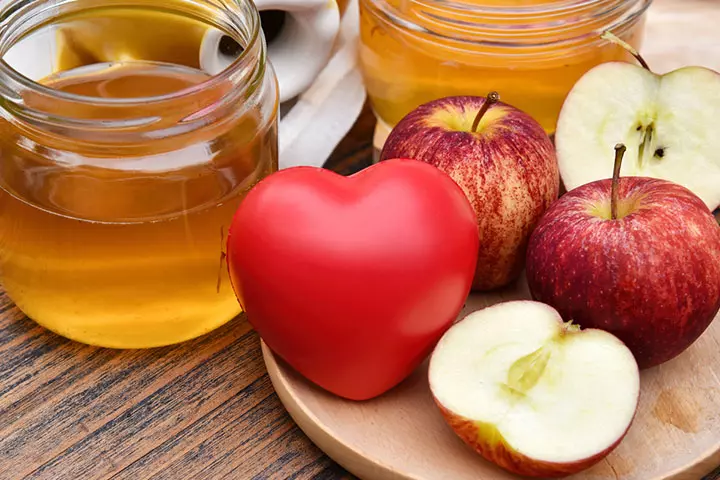
6. Detoxification: Apple cider vinegar, used medicinally, can help detoxify the body. Its regular use can also help restore the body’s pH balance (3).
 Did you know?
Did you know?Possible Side-Effects Of ACV When Breastfeeding
Apple cider vinegar could cause side effects that might affect breastfeeding. A few of them are (11):
1. Low potassium levels: Excessive consumption of ACV is associated with low potassium levels. If you take medications for high blood pressure (generally diuretics), then apple cider vinegar intake can worsen the levels of potassium.
2. Low sugar levels: Apple cider vinegar is known to regulate sugar levels in people with diabetes. However, you should be cautious about the quantity of ACV since it can have a possible interaction with insulin. This interaction might cause a negative fluctuation in sugar levels, thus posing a threat to your health and overall well-being.
3. Digestive issues: ACV may cause stomach discomfort in some individuals. It is also believed to exacerbate the symptoms of acid reflux if consumed undiluted or in excess quantities (12).
4. Dental problems: ACV is acidic. Therefore, the consumption of too much ACV could harm one’s teeth by eroding the enamel, making it more susceptible to wear and tear (13).
Before incorporating apple cider vinegar into your diet while breastfeeding, it is advisable to consult with a healthcare professional or a lactation consultant. Personalized guidance can help ensure that you make informed choices that prioritize your health and the well-being of your baby.
Precautions To Take While Taking Apple Cider Vinegar
Apple cider vinegar is likely safe to use. However, to mitigate the risk of any side-effects, you may follow these precautions.
- Buy only organic, filtered, and pasteurized apple cider vinegar from a reputable brand.
- Dilute the vinegar with water. Undiluted ACV is acidic and can burn the tissues of your mouth and throat. The recommended dilution is two tablespoons (30ml) of cider vinegar to 8oz (237ml) of water for safe consumption (14).
- Consume cider vinegar in moderate amounts only. Excessive use can cause low mineral density.
- Always rinse your mouth after consuming ACV, even if it is diluted. It will ensure that the pH of the oral cavity is maintained, and thus, tooth enamel damage is counteracted.
- If you are planning to use ACV topically, then use it only in the diluted form to avoid any burns to your skin.
Simple Recipes Using Apple Cider Vinegar, For Breastfeeding Mothers
1. Honey and apple cider vinegar drink

This recipe is a perfect addition to your early morning routine. The sweetness of honey with the tanginess of apple cider vinegar is a unique combination that lightens up your lazy mornings, adds a boost of hydration, and gets you going.
You will need:
- 2 cups of water
- ½tsp of organic honey
- 1tbsp apple cider vinegar
- 1tsp lemon juice
- A dash of red pepper
- Ice cubes
How to:
- Pour the water into a glass and add the ingredients to the solution. Mix well.
- Add ice cubes to flavor it. Your detox drink is ready.
Tip:
You can add one teaspoon of chia seeds to this recipe. If you plan to add chia seeds for breastfeeding mothers, then keep the drink refrigerated for 15-20 minutes before consuming it.
2. Herbal tea with apple cider vinegar

It is a good addition to your diet after a meal or early evening routine. The calming effects of herbal tea while breastfeeding with the zesty flavor of ACV can make you feel refreshed after an exhaustive day.
You will need:
- 1tsp apple cider vinegar
- ½tsp lemon juice
- 2-3 drops of honey
- 1 green tea bag
- Sliced ginger strips
- A dash of cinnamon
How to:
- Prepare one cup of green tea and steep it in water for about three to four minutes.
- Filter the tea in a cup and add the remaining ingredients. Mix well before consuming.
3. Apple cider vinegar salad dressing

This recipe is a valuable addition to your salads. Drizzle this dressing over your vegetable or chicken salad and enjoy the tangy flavor.
You will need:
- ¼ cup cider vinegar
- 1tsp lemon juice
- ¼ cup extra virgin olive oil
- 1tsp red pepper
- Salt and pepper to taste
How to:
- Whisk apple cider vinegar, red pepper, and lemon juice in a small bowl.
- Slowly add the olive oil to the mixture and stir it well.
- Season the salad dressing with salt and pepper.
- You can also refrigerate the content in an air-tight container and mix it with freshly chopped salad vegetables.
 Quick tip
Quick tipFrequently Asked Questions
1. Can apple cider vinegar help with hair loss while breastfeeding?
Apple cider vinegar contains acetic acid, which may strengthen hair follicles (14) (15). While ACV is touted as a natural remedy for hair loss, there is limited research on its effectiveness in restoring hair in bald patches.
2. Can apple cider vinegar affect the quality of breast milk?
There is no clear scientific evidence to suggest that apple cider vinegar affects the quality of breast milk.
3. Can apple cider vinegar help with milk production while breastfeeding?
While apple cider vinegar has been touted for its various health benefits, including improving digestion and weight loss, there is no research to suggest that it has any effect on the mother’s milk supply.
4. Can apple cider vinegar help with acid reflux while breastfeeding?
Some speculate that apple cider vinegar, as a probiotic, balances the gut microbiota, reducing acid reflux symptoms. However, there is insufficient research to confirm its effectiveness (16).
5. Can apple cider vinegar help with allergies and sinusitis while breastfeeding?
Purportedly, apple cider vinegar, due to its potassium content, breaks up mucus and supports lymphatic drainage, relieving allergy and chronic sinusitis symptoms (14). Although some people may experience relief after consuming apple cider vinegar, it is an unreliable and inconsistent remedy.
It is safe to consume filtered, organic, and pasteurized apple cider vinegar while breastfeeding. Although raw and unfiltered apple cider vinegar may contain nutrients, there is a higher chance of contamination with bacteria. Apple cider vinegar contains antioxidants, minerals, vitamins, and arctic acid to promote good health. It may enhance immunity and digestive and cardiovascular health. They are also known to aid in weight loss and detoxify the body. However, avoid excess intake since it may lead to low sugar levels and potassium levels in the body. You may use it in salads, herbal teas, or honey and water. Ensure to purchase from trusted sources and store as per recommended guidelines.
Infographic: How To Use ACV To Address Skin And Hair Problems?
Pregnancy and childbirth cause hormonal changes in the body that may result in several skin and hair problems. Additionally, new moms have very less time to care for themselves. The infographic below explains some simple ways to use apple cider vinegar for quick and effective skin and hair care for new mommies. Illustration: Momjunction Design Team

Illustration: Is It Safe To Take Apple Cider Vinegar While Breastfeeding?

Image: Stable Diffusion/MomJunction Design Team
Personal Experience: Source
MomJunction articles include first-hand experiences to provide you with better insights through real-life narratives. Here are the sources of personal accounts referenced in this article.
i. How to mix ACV drink while pregnant & nursing || OB-GYN recommendation;https://www.youtube.com/watch?feature=shared&v=CbmvPJ-_LD0
References
1. Zeshan Ali et al., Potential Uses of Vinegar as a Medicine and Related in vivo Mechanisms; Researchgate
2. Food Safety by Type of Food; U.S Department of Health and Human Service
3. Akanksha Singh and Sumitra Mishra; Study About The Nutritional and Medicinal Properties of Apple Cider Vinegar Article Info Abstract; Researchgate
4. Kondo T et al., Vinegar intake reduces body weight, body fat mass, and serum triglyceride levels in obese Japanese subjects.; National Center For Biotechnology Information
5. Heitor Santos et al., Vinegar (acetic acid) intake on glucose metabolism: A narrative review; Researchgate
6. Fahad Javaid Siddiqui et al., Diabetes Control: Is Vinegar a Promising Candidate to Help Achieve Targets?; National Center For Biotechnology Information
7. Hmad Halima B et al., Antidiabetic and Antioxidant Effects of Apple Cider Vinegar on Normal and Streptozotocin-Induced Diabetic Rats.; National Center For Biotechnology Information
8. Thomas Bjarnsholt et al., Antibiofilm Properties of Acetic Acid; National Center For Biotechnology Information
9. Safari R et al., Apple cider vinegar boosted immunomodulatory and health promoting effects of Lactobacillus casei in common carp (Cyprinus carpio).; National Center For Biotechnology Information
10. Nazıroglu M et al., Apple cider vinegar modulates serum lipid profile, erythrocyte, kidney, and liver membrane oxidative stress in ovariectomized mice fed high cholesterol.; National Center For Biotechnology Information
11. Apple cider vinegar diet: Does it really work?; Harvard Health Publishing
12. What are the benefits of apple cider vinegar?; Mather Hospital Northwell Health
13. Is apple cider vinegar harming your teeth?; Ethos Orthodontics
14. What Does Apple Cider Vinegar Not Do; Pacific College of Health and Science
15. Waleed Y. Rizg et al.;Preparation and Optimization of Garlic Oil/Apple Cider Vinegar Nanoemulsion Loaded with Minoxidil to Treat Alopecia?; MDPI
16. Can Apple Cider Vinegar Help With Weight Loss?; Cleveland Clinic
17. Klaudia Kamińska et al; Probiotics in the Prevention and Treatment of Gestational Diabetes Mellitus (GDM): A Review; National Center For Biotechnology Information
Community Experiences
Join the conversation and become a part of our nurturing community! Share your stories, experiences, and insights to connect with fellow parents.
Read full bio of Melissa Kotlen
Read full bio of Swati Patwal
Read full bio of Rohit Garoo
Read full bio of Anindita Ghatak







